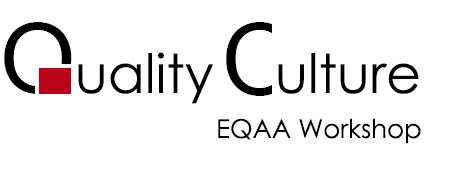Event Details
Background:
Quality and quality assurance are an on-going and major focus for universities in the pursuit of continuously offering better services.
As part of their activities, universities are introducing and strengthening internal quality assurance systems, undergo national and sometimes foreign or international accreditation. They have created departments and units responsible for quality assurance, which have developed various forms, procedures, and manuals. They are busy with concepts like TQM, looking at ISO standards, assessing checklists by quality assurance agencies etc.
Yet, universities often struggle to create a culture of quality in which, besides the senior leadership, each member of faculty and staff places a focus on quality and quality assurance. Often, it is believed that this is simply the responsibility of the designated department or other unit in charge of quality assurance, whilst it needs to be an effort of the entire institutional community in order to enhance quality to the greatest extent possible. In other words, universities are much more successful in enhancing quality and also in creating a more attractive and appealing environment for faculty, staff and students if they succeed in viewing quality as inherent to the daily life of the institution, rather than viewing quality as a responsibility of specific offices. Activities related to quality need to be understood as an integral part of everybody’s portfolio. When such a commitment is achieved throughout a university, it yields much more impactful, far-reaching and sustainable outcomes than simply implementing various sophisticated quality management tools and concepts.
Regional specifics in the Gulf:
The workshop is specifically tailored to the context of universities in the Gulf region. Even though the challenges differ to some extent between individual Gulf countries, the universities in the region face common challenges. The changing face of the Gulf economies and the growing demand for highly skilled graduates for a changing labour market with emerging knowledge intense industries are among the socio-economic shifts that place a focus on universities. Expectations by society and labour market from the education system and universities in particular are growing and are reflected in the governments’ policies and long term strategies. Additionally in times of an ever-increasing number of students and growth of institution, it is vital that quality remains in the focus of attention. In some cases, the universities also aim at becoming attractive for international students, which is yet another motivation for an institution to ensure a high reputation of its teaching and research activities.
These contextual factors are among the most influential drivers for the growing emphasis on quality assurance in the Gulf region’s higher education systems. Many universities progressed noticeably in setting up internal quality assurance structures and procedures and thereby achieved considerable results. However, often difficulties arise in making the quality focus equally present and sustainable throughout the institution. The concept of quality culture is therefore a means to ensure long-lasting and deep impact of quality related activities and reforms.
Aims of the Workshop:
This workshop will explore the concept of an institutional quality culture. It will equip participants with ideas and strategies that will help to create such a culture and fully embed it in all areas of operations of a university.
Highly renown and experienced experts in the field of quality in higher education will share their expertise on and experience with quality culture at universities. Their contributions will address the topic from different perspectives based on experiences from the Gulf region and other parts of the world. The inputs will relate to the concept and practical implications of quality culture. Hence, the workshop will be hands-on so that participants will be able to introduce and implement these concepts at their institutions.
The workshop is aimed at senior level representatives, such as Vice-Presidents in charge of Quality or Directors of Quality Assurance. Other participants, such as representatives from quality assurance agencies or other interested institutions and organisations are of course also welcome to attend.

